Events Financial Management Report: Wonderland Agency, BBC Party
VerifiedAdded on 2020/04/21
|18
|4017
|80
Report
AI Summary
This report examines the financial management practices of Wonderland Agency, an event management firm, focusing on a corporate party planned for the BBC. It analyzes key aspects of financial management within the events industry, including capital needs anticipation, capital composition, and investment of funds. The report evaluates and recommends various sources of finance such as crowd funding, angel investors, bank loans, advance ticket sales, sponsorship, and sale of exhibition space. It also analyzes and suggests relevant pricing strategies like fixed hourly rates, flat fees, percentage of profits, and commission. A critical evaluation of cost-volume-profit (CVP) analysis is conducted, including break-even calculations and a break-even chart. The report recommends the flat fee pricing strategy for Wonderland Agency and provides insights into achieving financial success for the organization.
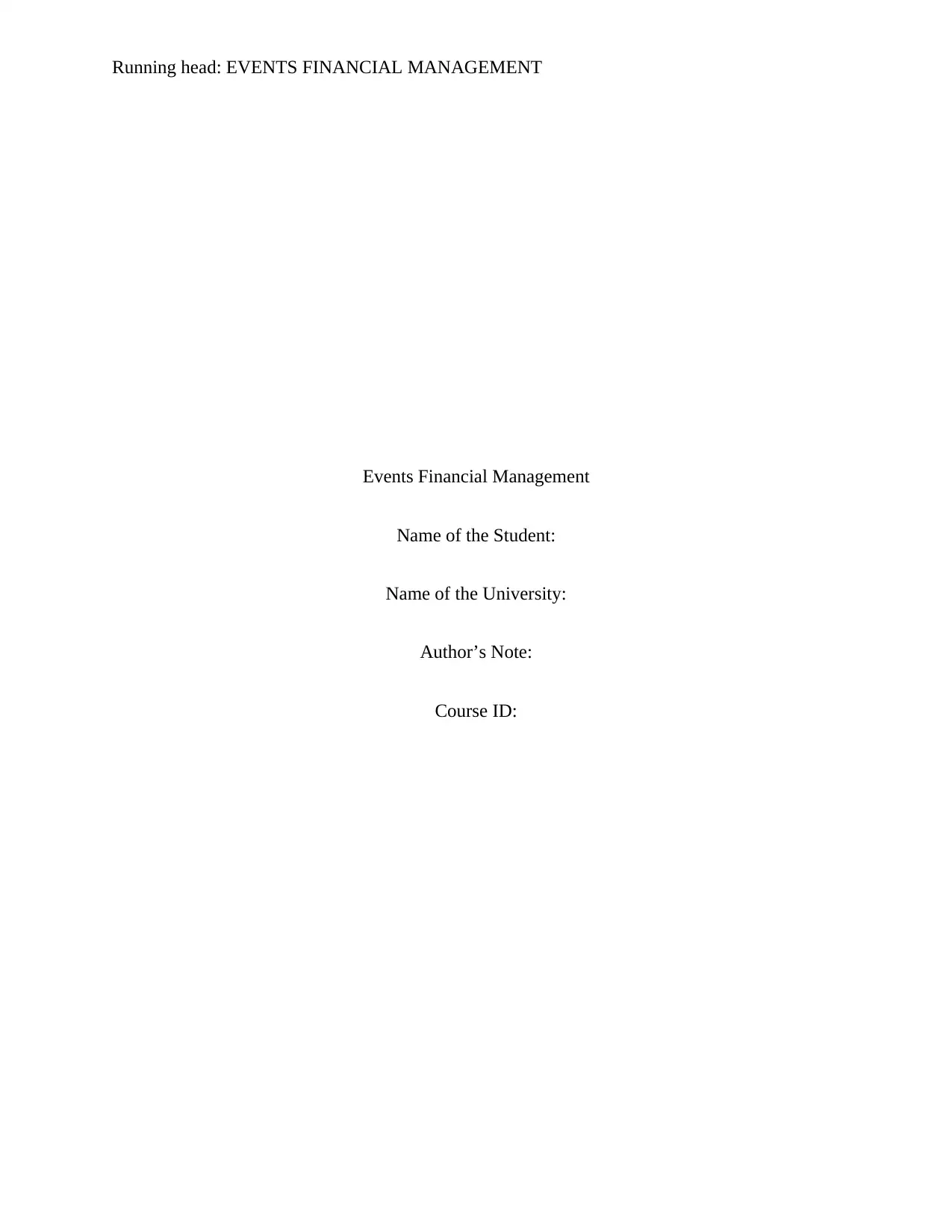
Running head: EVENTS FINANCIAL MANAGEMENT
Events Financial Management
Name of the Student:
Name of the University:
Author’s Note:
Course ID:
Events Financial Management
Name of the Student:
Name of the University:
Author’s Note:
Course ID:
Paraphrase This Document
Need a fresh take? Get an instant paraphrase of this document with our AI Paraphraser
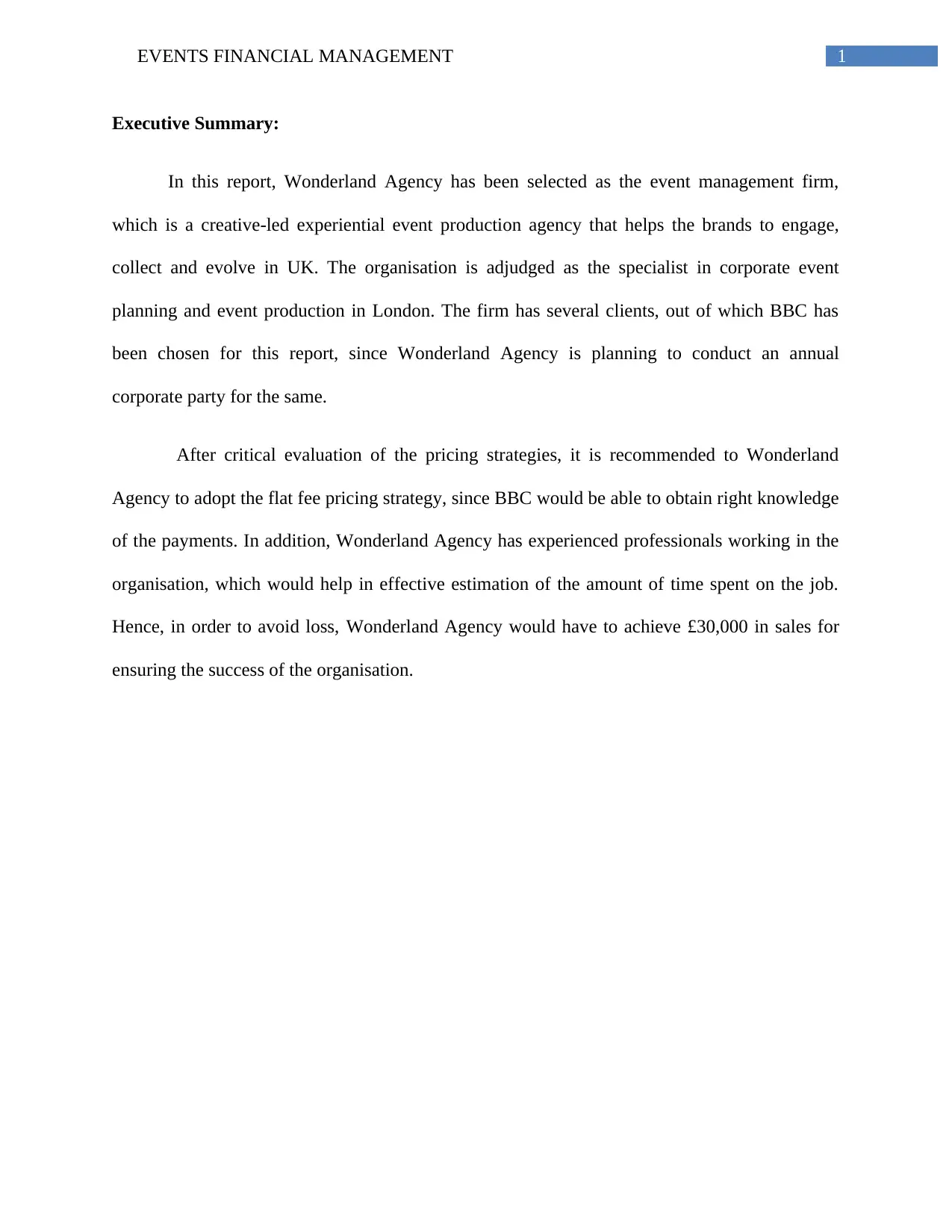
1EVENTS FINANCIAL MANAGEMENT
Executive Summary:
In this report, Wonderland Agency has been selected as the event management firm,
which is a creative-led experiential event production agency that helps the brands to engage,
collect and evolve in UK. The organisation is adjudged as the specialist in corporate event
planning and event production in London. The firm has several clients, out of which BBC has
been chosen for this report, since Wonderland Agency is planning to conduct an annual
corporate party for the same.
After critical evaluation of the pricing strategies, it is recommended to Wonderland
Agency to adopt the flat fee pricing strategy, since BBC would be able to obtain right knowledge
of the payments. In addition, Wonderland Agency has experienced professionals working in the
organisation, which would help in effective estimation of the amount of time spent on the job.
Hence, in order to avoid loss, Wonderland Agency would have to achieve £30,000 in sales for
ensuring the success of the organisation.
Executive Summary:
In this report, Wonderland Agency has been selected as the event management firm,
which is a creative-led experiential event production agency that helps the brands to engage,
collect and evolve in UK. The organisation is adjudged as the specialist in corporate event
planning and event production in London. The firm has several clients, out of which BBC has
been chosen for this report, since Wonderland Agency is planning to conduct an annual
corporate party for the same.
After critical evaluation of the pricing strategies, it is recommended to Wonderland
Agency to adopt the flat fee pricing strategy, since BBC would be able to obtain right knowledge
of the payments. In addition, Wonderland Agency has experienced professionals working in the
organisation, which would help in effective estimation of the amount of time spent on the job.
Hence, in order to avoid loss, Wonderland Agency would have to achieve £30,000 in sales for
ensuring the success of the organisation.
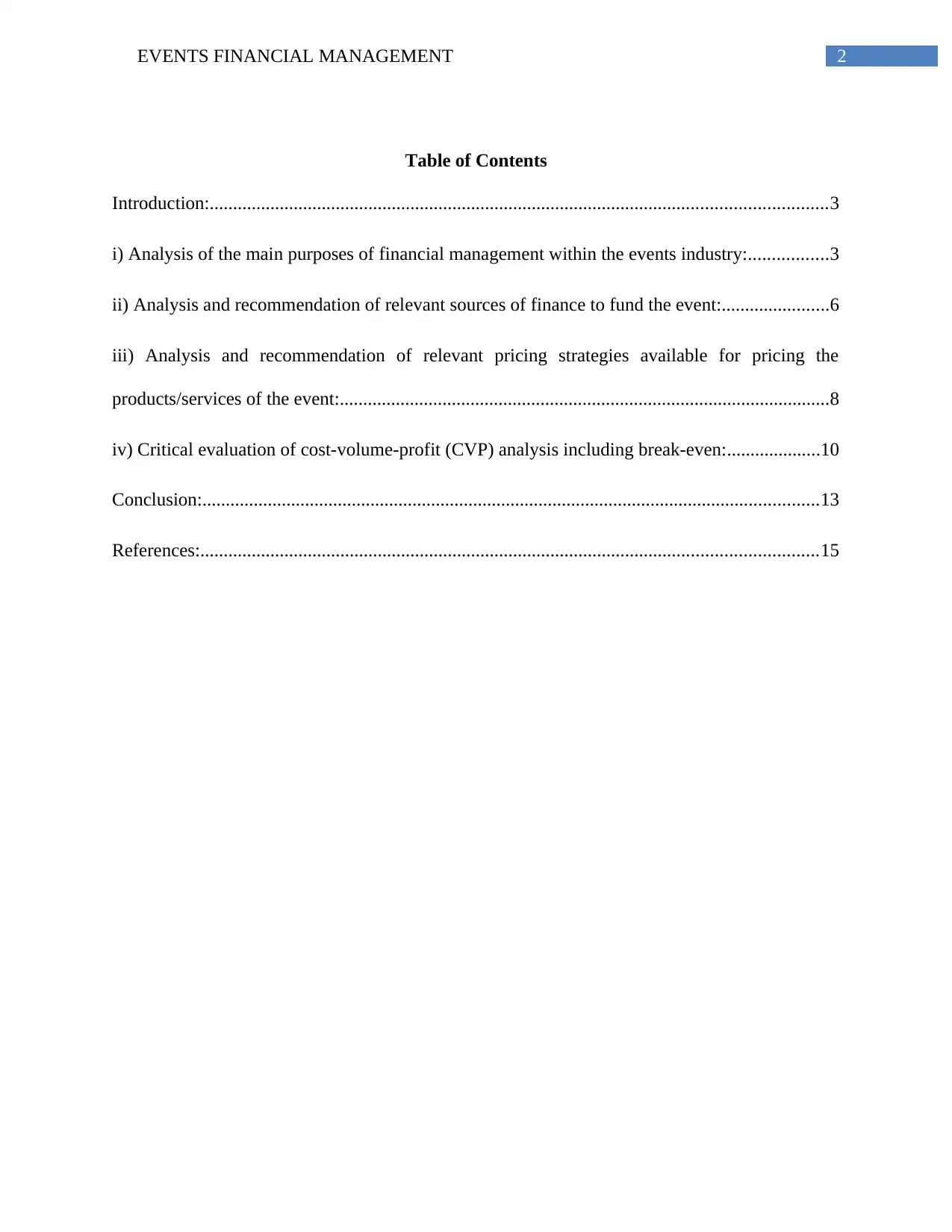
2EVENTS FINANCIAL MANAGEMENT
Table of Contents
Introduction:....................................................................................................................................3
i) Analysis of the main purposes of financial management within the events industry:.................3
ii) Analysis and recommendation of relevant sources of finance to fund the event:.......................6
iii) Analysis and recommendation of relevant pricing strategies available for pricing the
products/services of the event:.........................................................................................................8
iv) Critical evaluation of cost-volume-profit (CVP) analysis including break-even:....................10
Conclusion:....................................................................................................................................13
References:....................................................................................................................................15
Table of Contents
Introduction:....................................................................................................................................3
i) Analysis of the main purposes of financial management within the events industry:.................3
ii) Analysis and recommendation of relevant sources of finance to fund the event:.......................6
iii) Analysis and recommendation of relevant pricing strategies available for pricing the
products/services of the event:.........................................................................................................8
iv) Critical evaluation of cost-volume-profit (CVP) analysis including break-even:....................10
Conclusion:....................................................................................................................................13
References:....................................................................................................................................15
⊘ This is a preview!⊘
Do you want full access?
Subscribe today to unlock all pages.

Trusted by 1+ million students worldwide
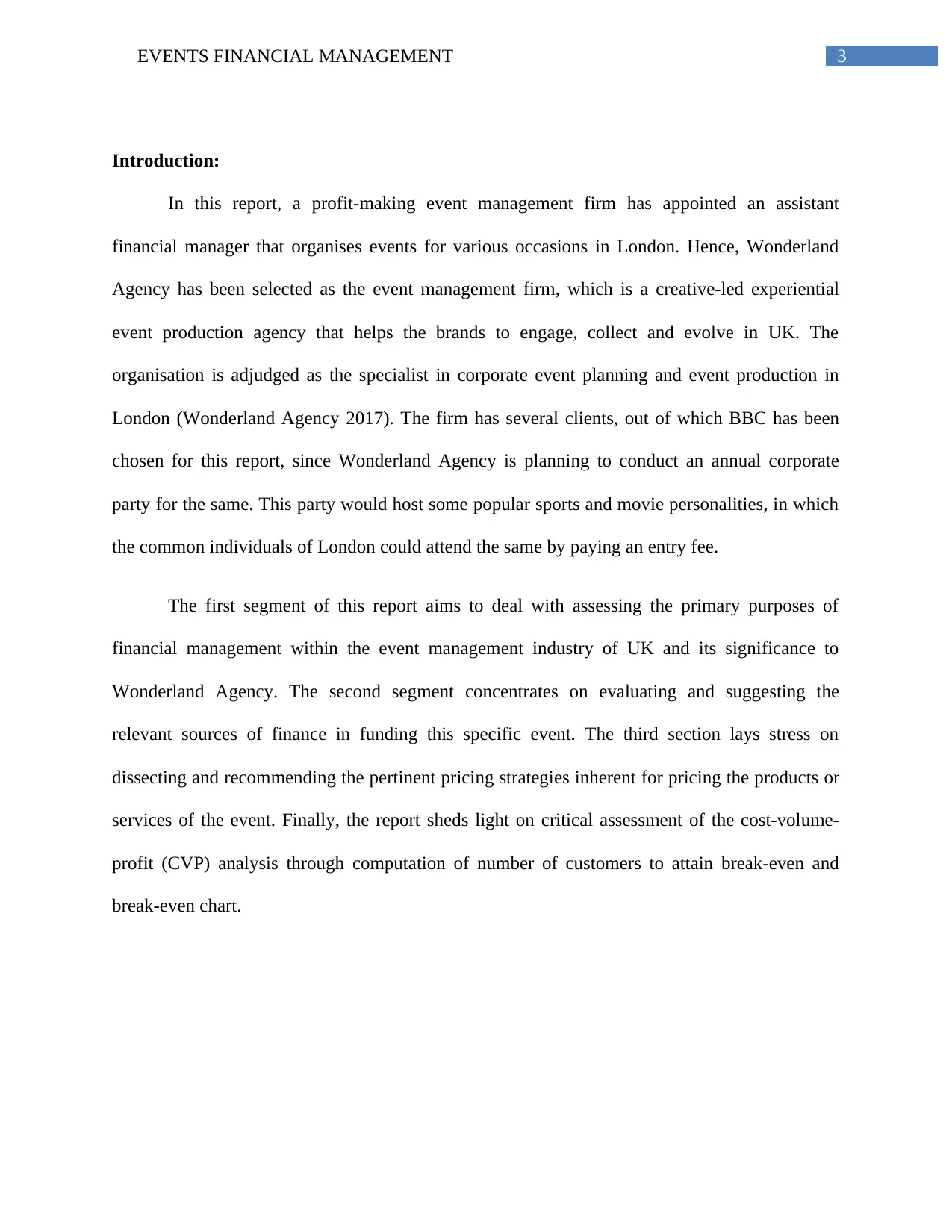
3EVENTS FINANCIAL MANAGEMENT
Introduction:
In this report, a profit-making event management firm has appointed an assistant
financial manager that organises events for various occasions in London. Hence, Wonderland
Agency has been selected as the event management firm, which is a creative-led experiential
event production agency that helps the brands to engage, collect and evolve in UK. The
organisation is adjudged as the specialist in corporate event planning and event production in
London (Wonderland Agency 2017). The firm has several clients, out of which BBC has been
chosen for this report, since Wonderland Agency is planning to conduct an annual corporate
party for the same. This party would host some popular sports and movie personalities, in which
the common individuals of London could attend the same by paying an entry fee.
The first segment of this report aims to deal with assessing the primary purposes of
financial management within the event management industry of UK and its significance to
Wonderland Agency. The second segment concentrates on evaluating and suggesting the
relevant sources of finance in funding this specific event. The third section lays stress on
dissecting and recommending the pertinent pricing strategies inherent for pricing the products or
services of the event. Finally, the report sheds light on critical assessment of the cost-volume-
profit (CVP) analysis through computation of number of customers to attain break-even and
break-even chart.
Introduction:
In this report, a profit-making event management firm has appointed an assistant
financial manager that organises events for various occasions in London. Hence, Wonderland
Agency has been selected as the event management firm, which is a creative-led experiential
event production agency that helps the brands to engage, collect and evolve in UK. The
organisation is adjudged as the specialist in corporate event planning and event production in
London (Wonderland Agency 2017). The firm has several clients, out of which BBC has been
chosen for this report, since Wonderland Agency is planning to conduct an annual corporate
party for the same. This party would host some popular sports and movie personalities, in which
the common individuals of London could attend the same by paying an entry fee.
The first segment of this report aims to deal with assessing the primary purposes of
financial management within the event management industry of UK and its significance to
Wonderland Agency. The second segment concentrates on evaluating and suggesting the
relevant sources of finance in funding this specific event. The third section lays stress on
dissecting and recommending the pertinent pricing strategies inherent for pricing the products or
services of the event. Finally, the report sheds light on critical assessment of the cost-volume-
profit (CVP) analysis through computation of number of customers to attain break-even and
break-even chart.
Paraphrase This Document
Need a fresh take? Get an instant paraphrase of this document with our AI Paraphraser
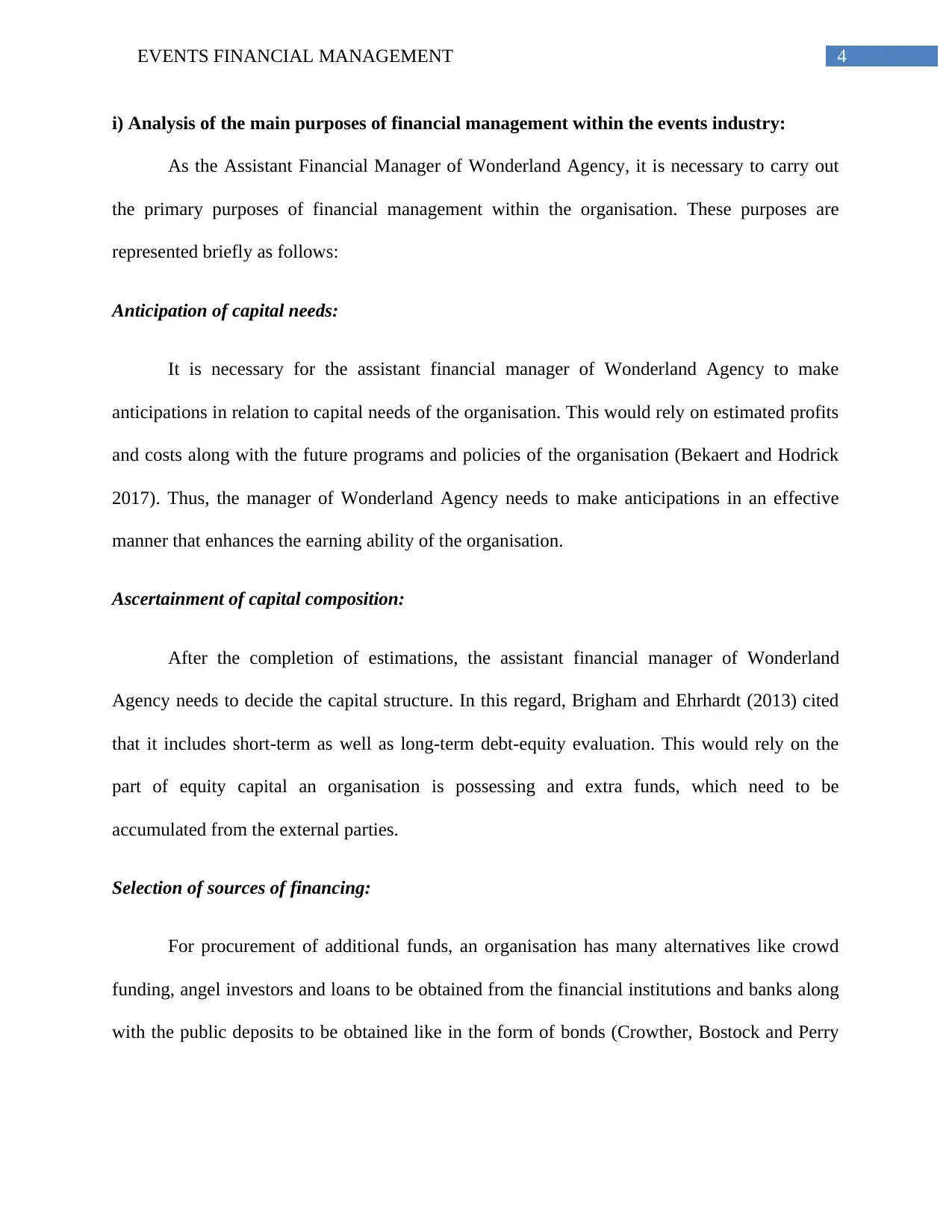
4EVENTS FINANCIAL MANAGEMENT
i) Analysis of the main purposes of financial management within the events industry:
As the Assistant Financial Manager of Wonderland Agency, it is necessary to carry out
the primary purposes of financial management within the organisation. These purposes are
represented briefly as follows:
Anticipation of capital needs:
It is necessary for the assistant financial manager of Wonderland Agency to make
anticipations in relation to capital needs of the organisation. This would rely on estimated profits
and costs along with the future programs and policies of the organisation (Bekaert and Hodrick
2017). Thus, the manager of Wonderland Agency needs to make anticipations in an effective
manner that enhances the earning ability of the organisation.
Ascertainment of capital composition:
After the completion of estimations, the assistant financial manager of Wonderland
Agency needs to decide the capital structure. In this regard, Brigham and Ehrhardt (2013) cited
that it includes short-term as well as long-term debt-equity evaluation. This would rely on the
part of equity capital an organisation is possessing and extra funds, which need to be
accumulated from the external parties.
Selection of sources of financing:
For procurement of additional funds, an organisation has many alternatives like crowd
funding, angel investors and loans to be obtained from the financial institutions and banks along
with the public deposits to be obtained like in the form of bonds (Crowther, Bostock and Perry
i) Analysis of the main purposes of financial management within the events industry:
As the Assistant Financial Manager of Wonderland Agency, it is necessary to carry out
the primary purposes of financial management within the organisation. These purposes are
represented briefly as follows:
Anticipation of capital needs:
It is necessary for the assistant financial manager of Wonderland Agency to make
anticipations in relation to capital needs of the organisation. This would rely on estimated profits
and costs along with the future programs and policies of the organisation (Bekaert and Hodrick
2017). Thus, the manager of Wonderland Agency needs to make anticipations in an effective
manner that enhances the earning ability of the organisation.
Ascertainment of capital composition:
After the completion of estimations, the assistant financial manager of Wonderland
Agency needs to decide the capital structure. In this regard, Brigham and Ehrhardt (2013) cited
that it includes short-term as well as long-term debt-equity evaluation. This would rely on the
part of equity capital an organisation is possessing and extra funds, which need to be
accumulated from the external parties.
Selection of sources of financing:
For procurement of additional funds, an organisation has many alternatives like crowd
funding, angel investors and loans to be obtained from the financial institutions and banks along
with the public deposits to be obtained like in the form of bonds (Crowther, Bostock and Perry
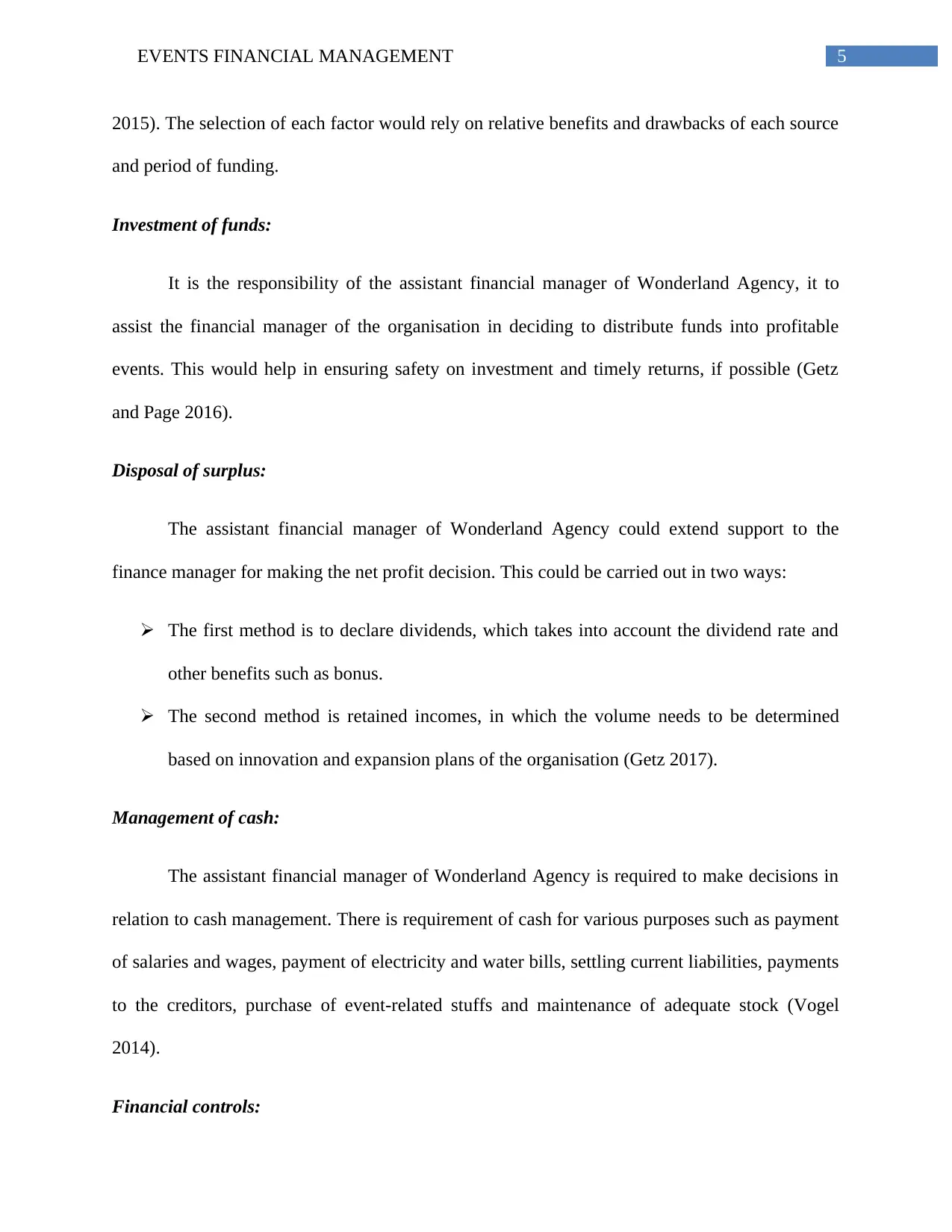
5EVENTS FINANCIAL MANAGEMENT
2015). The selection of each factor would rely on relative benefits and drawbacks of each source
and period of funding.
Investment of funds:
It is the responsibility of the assistant financial manager of Wonderland Agency, it to
assist the financial manager of the organisation in deciding to distribute funds into profitable
events. This would help in ensuring safety on investment and timely returns, if possible (Getz
and Page 2016).
Disposal of surplus:
The assistant financial manager of Wonderland Agency could extend support to the
finance manager for making the net profit decision. This could be carried out in two ways:
The first method is to declare dividends, which takes into account the dividend rate and
other benefits such as bonus.
The second method is retained incomes, in which the volume needs to be determined
based on innovation and expansion plans of the organisation (Getz 2017).
Management of cash:
The assistant financial manager of Wonderland Agency is required to make decisions in
relation to cash management. There is requirement of cash for various purposes such as payment
of salaries and wages, payment of electricity and water bills, settling current liabilities, payments
to the creditors, purchase of event-related stuffs and maintenance of adequate stock (Vogel
2014).
Financial controls:
2015). The selection of each factor would rely on relative benefits and drawbacks of each source
and period of funding.
Investment of funds:
It is the responsibility of the assistant financial manager of Wonderland Agency, it to
assist the financial manager of the organisation in deciding to distribute funds into profitable
events. This would help in ensuring safety on investment and timely returns, if possible (Getz
and Page 2016).
Disposal of surplus:
The assistant financial manager of Wonderland Agency could extend support to the
finance manager for making the net profit decision. This could be carried out in two ways:
The first method is to declare dividends, which takes into account the dividend rate and
other benefits such as bonus.
The second method is retained incomes, in which the volume needs to be determined
based on innovation and expansion plans of the organisation (Getz 2017).
Management of cash:
The assistant financial manager of Wonderland Agency is required to make decisions in
relation to cash management. There is requirement of cash for various purposes such as payment
of salaries and wages, payment of electricity and water bills, settling current liabilities, payments
to the creditors, purchase of event-related stuffs and maintenance of adequate stock (Vogel
2014).
Financial controls:
⊘ This is a preview!⊘
Do you want full access?
Subscribe today to unlock all pages.

Trusted by 1+ million students worldwide
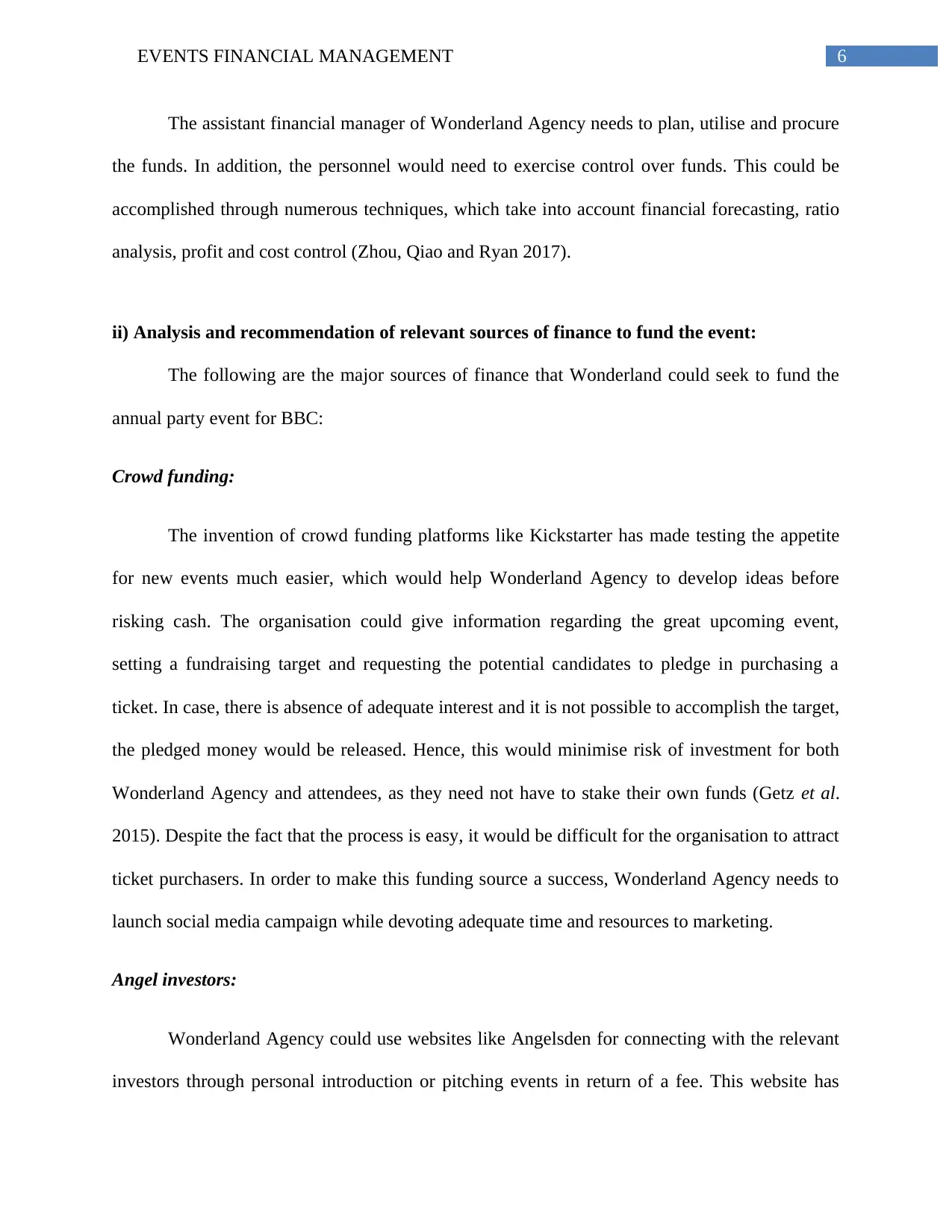
6EVENTS FINANCIAL MANAGEMENT
The assistant financial manager of Wonderland Agency needs to plan, utilise and procure
the funds. In addition, the personnel would need to exercise control over funds. This could be
accomplished through numerous techniques, which take into account financial forecasting, ratio
analysis, profit and cost control (Zhou, Qiao and Ryan 2017).
ii) Analysis and recommendation of relevant sources of finance to fund the event:
The following are the major sources of finance that Wonderland could seek to fund the
annual party event for BBC:
Crowd funding:
The invention of crowd funding platforms like Kickstarter has made testing the appetite
for new events much easier, which would help Wonderland Agency to develop ideas before
risking cash. The organisation could give information regarding the great upcoming event,
setting a fundraising target and requesting the potential candidates to pledge in purchasing a
ticket. In case, there is absence of adequate interest and it is not possible to accomplish the target,
the pledged money would be released. Hence, this would minimise risk of investment for both
Wonderland Agency and attendees, as they need not have to stake their own funds (Getz et al.
2015). Despite the fact that the process is easy, it would be difficult for the organisation to attract
ticket purchasers. In order to make this funding source a success, Wonderland Agency needs to
launch social media campaign while devoting adequate time and resources to marketing.
Angel investors:
Wonderland Agency could use websites like Angelsden for connecting with the relevant
investors through personal introduction or pitching events in return of a fee. This website has
The assistant financial manager of Wonderland Agency needs to plan, utilise and procure
the funds. In addition, the personnel would need to exercise control over funds. This could be
accomplished through numerous techniques, which take into account financial forecasting, ratio
analysis, profit and cost control (Zhou, Qiao and Ryan 2017).
ii) Analysis and recommendation of relevant sources of finance to fund the event:
The following are the major sources of finance that Wonderland could seek to fund the
annual party event for BBC:
Crowd funding:
The invention of crowd funding platforms like Kickstarter has made testing the appetite
for new events much easier, which would help Wonderland Agency to develop ideas before
risking cash. The organisation could give information regarding the great upcoming event,
setting a fundraising target and requesting the potential candidates to pledge in purchasing a
ticket. In case, there is absence of adequate interest and it is not possible to accomplish the target,
the pledged money would be released. Hence, this would minimise risk of investment for both
Wonderland Agency and attendees, as they need not have to stake their own funds (Getz et al.
2015). Despite the fact that the process is easy, it would be difficult for the organisation to attract
ticket purchasers. In order to make this funding source a success, Wonderland Agency needs to
launch social media campaign while devoting adequate time and resources to marketing.
Angel investors:
Wonderland Agency could use websites like Angelsden for connecting with the relevant
investors through personal introduction or pitching events in return of a fee. This website has
Paraphrase This Document
Need a fresh take? Get an instant paraphrase of this document with our AI Paraphraser
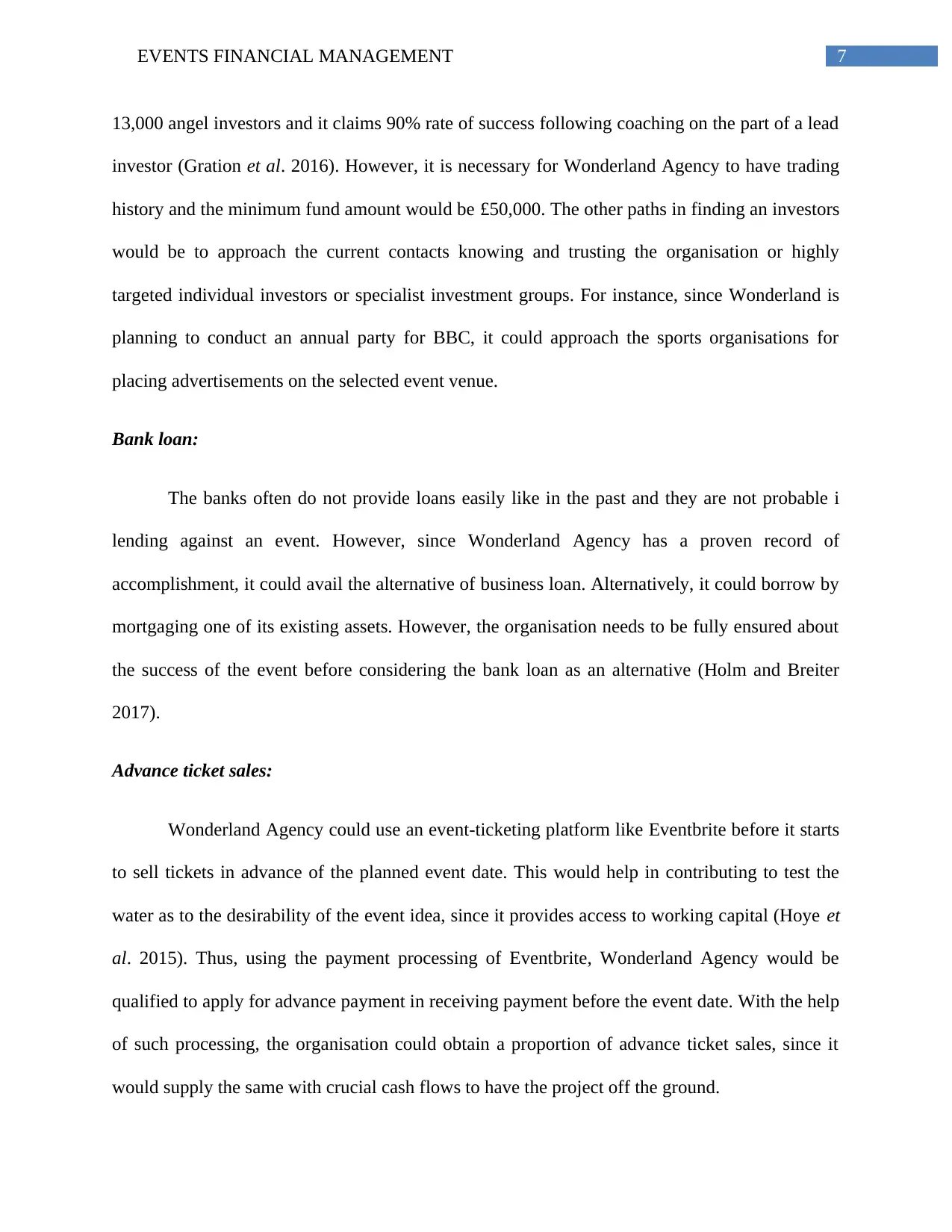
7EVENTS FINANCIAL MANAGEMENT
13,000 angel investors and it claims 90% rate of success following coaching on the part of a lead
investor (Gration et al. 2016). However, it is necessary for Wonderland Agency to have trading
history and the minimum fund amount would be £50,000. The other paths in finding an investors
would be to approach the current contacts knowing and trusting the organisation or highly
targeted individual investors or specialist investment groups. For instance, since Wonderland is
planning to conduct an annual party for BBC, it could approach the sports organisations for
placing advertisements on the selected event venue.
Bank loan:
The banks often do not provide loans easily like in the past and they are not probable i
lending against an event. However, since Wonderland Agency has a proven record of
accomplishment, it could avail the alternative of business loan. Alternatively, it could borrow by
mortgaging one of its existing assets. However, the organisation needs to be fully ensured about
the success of the event before considering the bank loan as an alternative (Holm and Breiter
2017).
Advance ticket sales:
Wonderland Agency could use an event-ticketing platform like Eventbrite before it starts
to sell tickets in advance of the planned event date. This would help in contributing to test the
water as to the desirability of the event idea, since it provides access to working capital (Hoye et
al. 2015). Thus, using the payment processing of Eventbrite, Wonderland Agency would be
qualified to apply for advance payment in receiving payment before the event date. With the help
of such processing, the organisation could obtain a proportion of advance ticket sales, since it
would supply the same with crucial cash flows to have the project off the ground.
13,000 angel investors and it claims 90% rate of success following coaching on the part of a lead
investor (Gration et al. 2016). However, it is necessary for Wonderland Agency to have trading
history and the minimum fund amount would be £50,000. The other paths in finding an investors
would be to approach the current contacts knowing and trusting the organisation or highly
targeted individual investors or specialist investment groups. For instance, since Wonderland is
planning to conduct an annual party for BBC, it could approach the sports organisations for
placing advertisements on the selected event venue.
Bank loan:
The banks often do not provide loans easily like in the past and they are not probable i
lending against an event. However, since Wonderland Agency has a proven record of
accomplishment, it could avail the alternative of business loan. Alternatively, it could borrow by
mortgaging one of its existing assets. However, the organisation needs to be fully ensured about
the success of the event before considering the bank loan as an alternative (Holm and Breiter
2017).
Advance ticket sales:
Wonderland Agency could use an event-ticketing platform like Eventbrite before it starts
to sell tickets in advance of the planned event date. This would help in contributing to test the
water as to the desirability of the event idea, since it provides access to working capital (Hoye et
al. 2015). Thus, using the payment processing of Eventbrite, Wonderland Agency would be
qualified to apply for advance payment in receiving payment before the event date. With the help
of such processing, the organisation could obtain a proportion of advance ticket sales, since it
would supply the same with crucial cash flows to have the project off the ground.
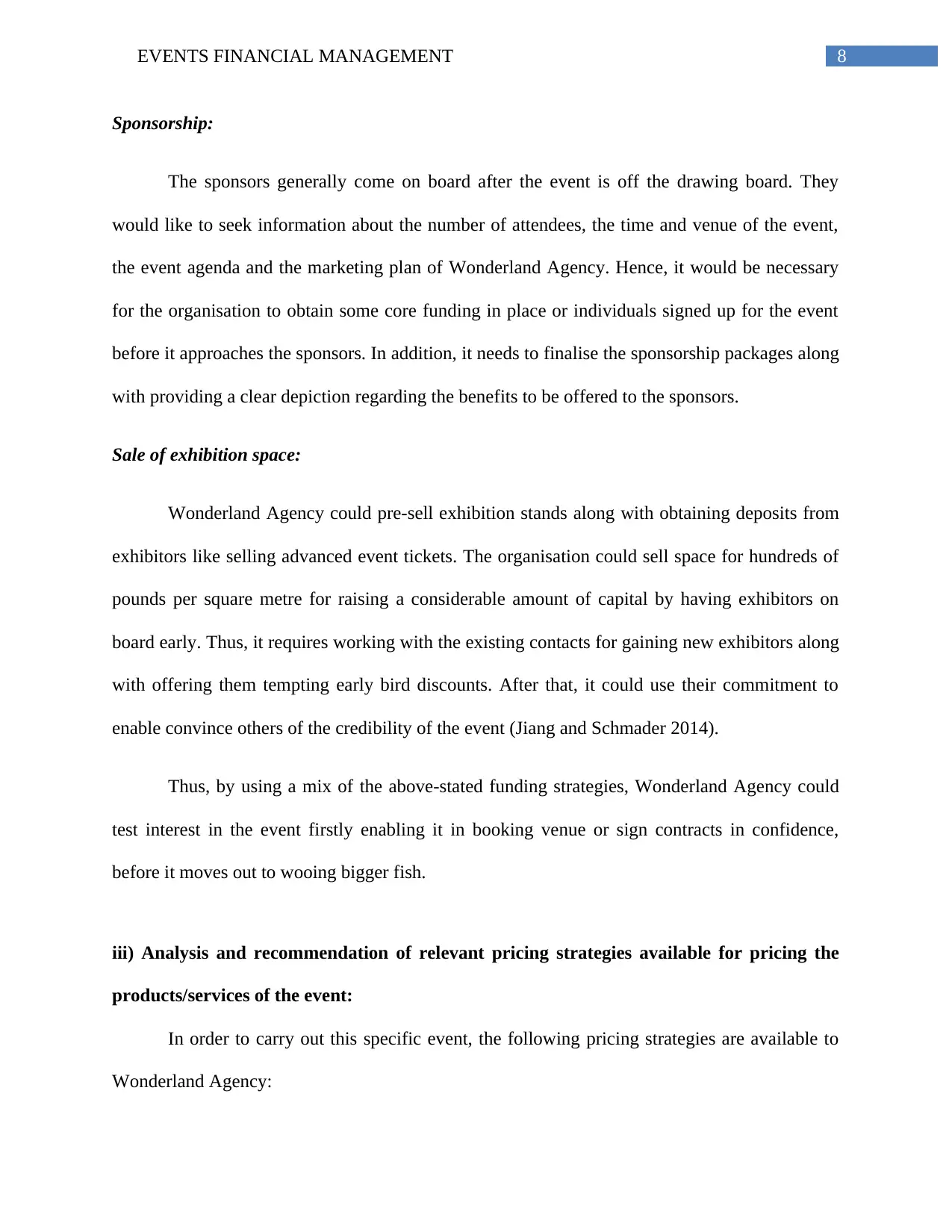
8EVENTS FINANCIAL MANAGEMENT
Sponsorship:
The sponsors generally come on board after the event is off the drawing board. They
would like to seek information about the number of attendees, the time and venue of the event,
the event agenda and the marketing plan of Wonderland Agency. Hence, it would be necessary
for the organisation to obtain some core funding in place or individuals signed up for the event
before it approaches the sponsors. In addition, it needs to finalise the sponsorship packages along
with providing a clear depiction regarding the benefits to be offered to the sponsors.
Sale of exhibition space:
Wonderland Agency could pre-sell exhibition stands along with obtaining deposits from
exhibitors like selling advanced event tickets. The organisation could sell space for hundreds of
pounds per square metre for raising a considerable amount of capital by having exhibitors on
board early. Thus, it requires working with the existing contacts for gaining new exhibitors along
with offering them tempting early bird discounts. After that, it could use their commitment to
enable convince others of the credibility of the event (Jiang and Schmader 2014).
Thus, by using a mix of the above-stated funding strategies, Wonderland Agency could
test interest in the event firstly enabling it in booking venue or sign contracts in confidence,
before it moves out to wooing bigger fish.
iii) Analysis and recommendation of relevant pricing strategies available for pricing the
products/services of the event:
In order to carry out this specific event, the following pricing strategies are available to
Wonderland Agency:
Sponsorship:
The sponsors generally come on board after the event is off the drawing board. They
would like to seek information about the number of attendees, the time and venue of the event,
the event agenda and the marketing plan of Wonderland Agency. Hence, it would be necessary
for the organisation to obtain some core funding in place or individuals signed up for the event
before it approaches the sponsors. In addition, it needs to finalise the sponsorship packages along
with providing a clear depiction regarding the benefits to be offered to the sponsors.
Sale of exhibition space:
Wonderland Agency could pre-sell exhibition stands along with obtaining deposits from
exhibitors like selling advanced event tickets. The organisation could sell space for hundreds of
pounds per square metre for raising a considerable amount of capital by having exhibitors on
board early. Thus, it requires working with the existing contacts for gaining new exhibitors along
with offering them tempting early bird discounts. After that, it could use their commitment to
enable convince others of the credibility of the event (Jiang and Schmader 2014).
Thus, by using a mix of the above-stated funding strategies, Wonderland Agency could
test interest in the event firstly enabling it in booking venue or sign contracts in confidence,
before it moves out to wooing bigger fish.
iii) Analysis and recommendation of relevant pricing strategies available for pricing the
products/services of the event:
In order to carry out this specific event, the following pricing strategies are available to
Wonderland Agency:
⊘ This is a preview!⊘
Do you want full access?
Subscribe today to unlock all pages.

Trusted by 1+ million students worldwide
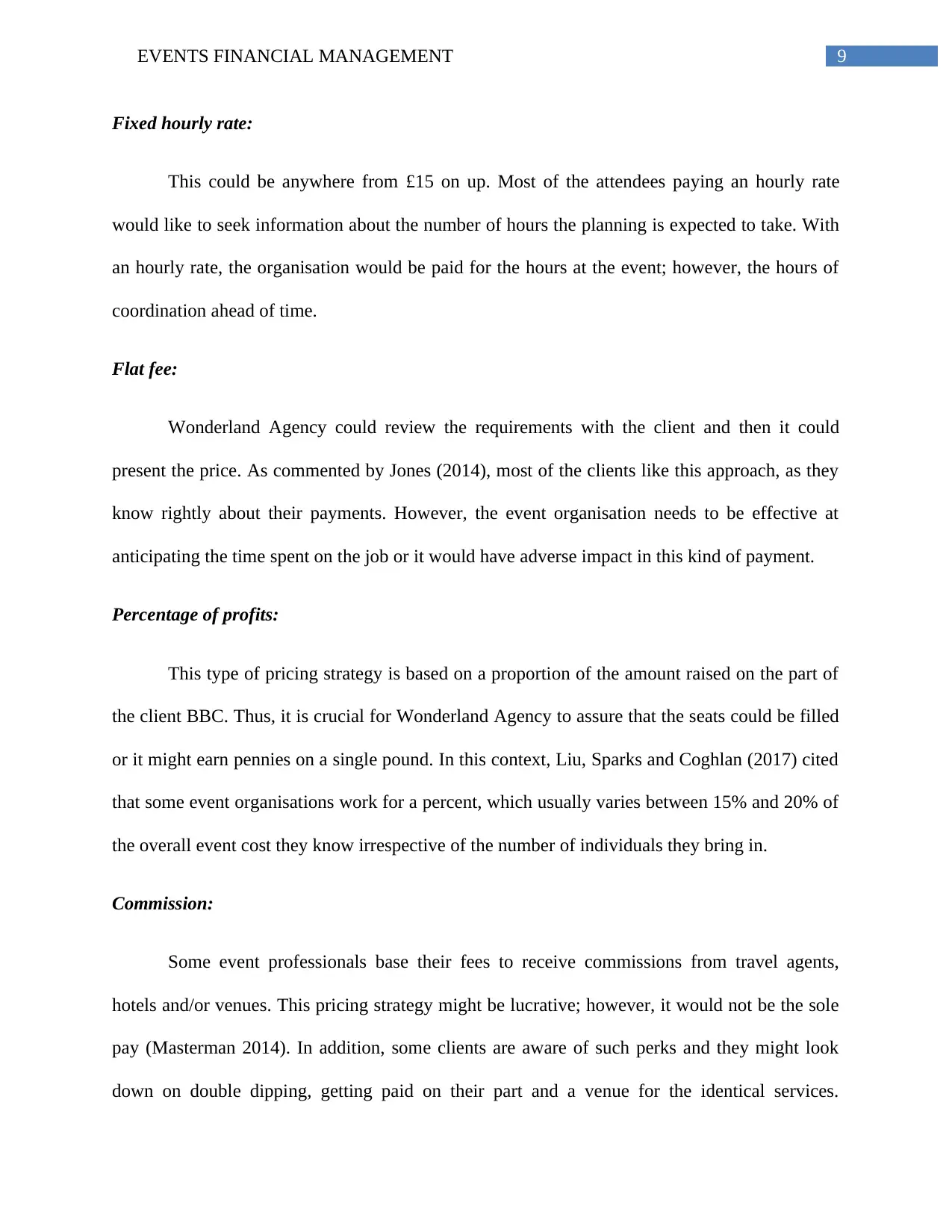
9EVENTS FINANCIAL MANAGEMENT
Fixed hourly rate:
This could be anywhere from £15 on up. Most of the attendees paying an hourly rate
would like to seek information about the number of hours the planning is expected to take. With
an hourly rate, the organisation would be paid for the hours at the event; however, the hours of
coordination ahead of time.
Flat fee:
Wonderland Agency could review the requirements with the client and then it could
present the price. As commented by Jones (2014), most of the clients like this approach, as they
know rightly about their payments. However, the event organisation needs to be effective at
anticipating the time spent on the job or it would have adverse impact in this kind of payment.
Percentage of profits:
This type of pricing strategy is based on a proportion of the amount raised on the part of
the client BBC. Thus, it is crucial for Wonderland Agency to assure that the seats could be filled
or it might earn pennies on a single pound. In this context, Liu, Sparks and Coghlan (2017) cited
that some event organisations work for a percent, which usually varies between 15% and 20% of
the overall event cost they know irrespective of the number of individuals they bring in.
Commission:
Some event professionals base their fees to receive commissions from travel agents,
hotels and/or venues. This pricing strategy might be lucrative; however, it would not be the sole
pay (Masterman 2014). In addition, some clients are aware of such perks and they might look
down on double dipping, getting paid on their part and a venue for the identical services.
Fixed hourly rate:
This could be anywhere from £15 on up. Most of the attendees paying an hourly rate
would like to seek information about the number of hours the planning is expected to take. With
an hourly rate, the organisation would be paid for the hours at the event; however, the hours of
coordination ahead of time.
Flat fee:
Wonderland Agency could review the requirements with the client and then it could
present the price. As commented by Jones (2014), most of the clients like this approach, as they
know rightly about their payments. However, the event organisation needs to be effective at
anticipating the time spent on the job or it would have adverse impact in this kind of payment.
Percentage of profits:
This type of pricing strategy is based on a proportion of the amount raised on the part of
the client BBC. Thus, it is crucial for Wonderland Agency to assure that the seats could be filled
or it might earn pennies on a single pound. In this context, Liu, Sparks and Coghlan (2017) cited
that some event organisations work for a percent, which usually varies between 15% and 20% of
the overall event cost they know irrespective of the number of individuals they bring in.
Commission:
Some event professionals base their fees to receive commissions from travel agents,
hotels and/or venues. This pricing strategy might be lucrative; however, it would not be the sole
pay (Masterman 2014). In addition, some clients are aware of such perks and they might look
down on double dipping, getting paid on their part and a venue for the identical services.
Paraphrase This Document
Need a fresh take? Get an instant paraphrase of this document with our AI Paraphraser
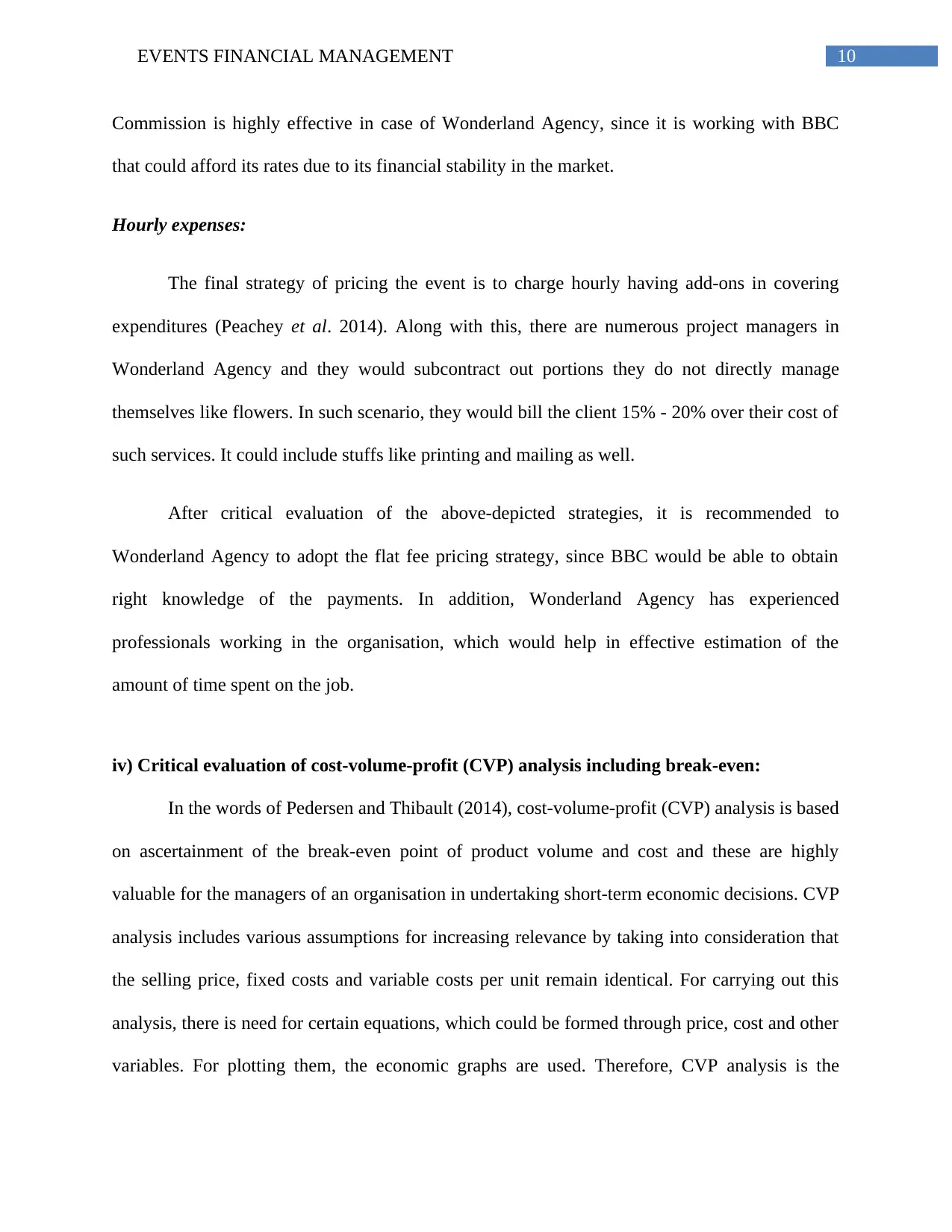
10EVENTS FINANCIAL MANAGEMENT
Commission is highly effective in case of Wonderland Agency, since it is working with BBC
that could afford its rates due to its financial stability in the market.
Hourly expenses:
The final strategy of pricing the event is to charge hourly having add-ons in covering
expenditures (Peachey et al. 2014). Along with this, there are numerous project managers in
Wonderland Agency and they would subcontract out portions they do not directly manage
themselves like flowers. In such scenario, they would bill the client 15% - 20% over their cost of
such services. It could include stuffs like printing and mailing as well.
After critical evaluation of the above-depicted strategies, it is recommended to
Wonderland Agency to adopt the flat fee pricing strategy, since BBC would be able to obtain
right knowledge of the payments. In addition, Wonderland Agency has experienced
professionals working in the organisation, which would help in effective estimation of the
amount of time spent on the job.
iv) Critical evaluation of cost-volume-profit (CVP) analysis including break-even:
In the words of Pedersen and Thibault (2014), cost-volume-profit (CVP) analysis is based
on ascertainment of the break-even point of product volume and cost and these are highly
valuable for the managers of an organisation in undertaking short-term economic decisions. CVP
analysis includes various assumptions for increasing relevance by taking into consideration that
the selling price, fixed costs and variable costs per unit remain identical. For carrying out this
analysis, there is need for certain equations, which could be formed through price, cost and other
variables. For plotting them, the economic graphs are used. Therefore, CVP analysis is the
Commission is highly effective in case of Wonderland Agency, since it is working with BBC
that could afford its rates due to its financial stability in the market.
Hourly expenses:
The final strategy of pricing the event is to charge hourly having add-ons in covering
expenditures (Peachey et al. 2014). Along with this, there are numerous project managers in
Wonderland Agency and they would subcontract out portions they do not directly manage
themselves like flowers. In such scenario, they would bill the client 15% - 20% over their cost of
such services. It could include stuffs like printing and mailing as well.
After critical evaluation of the above-depicted strategies, it is recommended to
Wonderland Agency to adopt the flat fee pricing strategy, since BBC would be able to obtain
right knowledge of the payments. In addition, Wonderland Agency has experienced
professionals working in the organisation, which would help in effective estimation of the
amount of time spent on the job.
iv) Critical evaluation of cost-volume-profit (CVP) analysis including break-even:
In the words of Pedersen and Thibault (2014), cost-volume-profit (CVP) analysis is based
on ascertainment of the break-even point of product volume and cost and these are highly
valuable for the managers of an organisation in undertaking short-term economic decisions. CVP
analysis includes various assumptions for increasing relevance by taking into consideration that
the selling price, fixed costs and variable costs per unit remain identical. For carrying out this
analysis, there is need for certain equations, which could be formed through price, cost and other
variables. For plotting them, the economic graphs are used. Therefore, CVP analysis is the
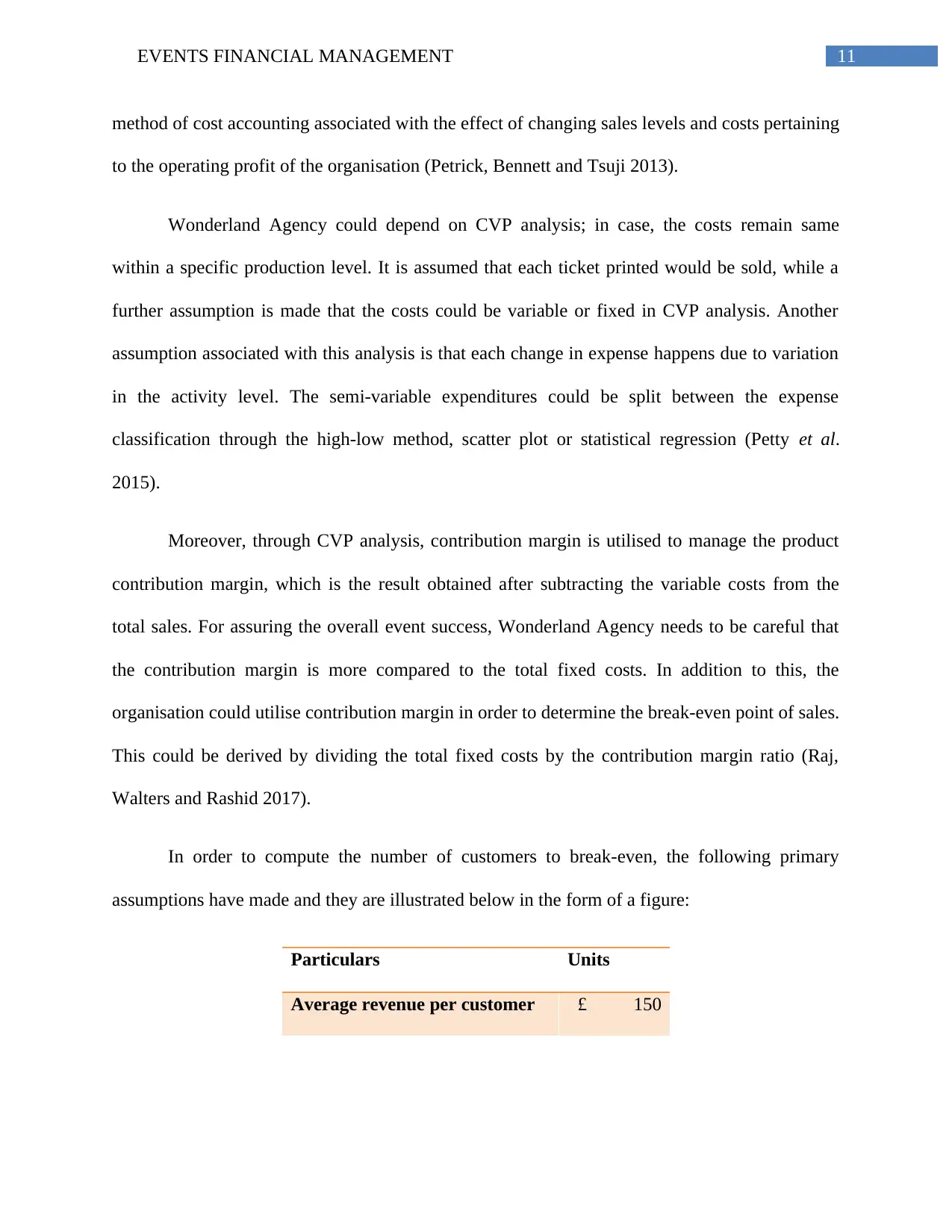
11EVENTS FINANCIAL MANAGEMENT
method of cost accounting associated with the effect of changing sales levels and costs pertaining
to the operating profit of the organisation (Petrick, Bennett and Tsuji 2013).
Wonderland Agency could depend on CVP analysis; in case, the costs remain same
within a specific production level. It is assumed that each ticket printed would be sold, while a
further assumption is made that the costs could be variable or fixed in CVP analysis. Another
assumption associated with this analysis is that each change in expense happens due to variation
in the activity level. The semi-variable expenditures could be split between the expense
classification through the high-low method, scatter plot or statistical regression (Petty et al.
2015).
Moreover, through CVP analysis, contribution margin is utilised to manage the product
contribution margin, which is the result obtained after subtracting the variable costs from the
total sales. For assuring the overall event success, Wonderland Agency needs to be careful that
the contribution margin is more compared to the total fixed costs. In addition to this, the
organisation could utilise contribution margin in order to determine the break-even point of sales.
This could be derived by dividing the total fixed costs by the contribution margin ratio (Raj,
Walters and Rashid 2017).
In order to compute the number of customers to break-even, the following primary
assumptions have made and they are illustrated below in the form of a figure:
Particulars Units
Average revenue per customer £ 150
method of cost accounting associated with the effect of changing sales levels and costs pertaining
to the operating profit of the organisation (Petrick, Bennett and Tsuji 2013).
Wonderland Agency could depend on CVP analysis; in case, the costs remain same
within a specific production level. It is assumed that each ticket printed would be sold, while a
further assumption is made that the costs could be variable or fixed in CVP analysis. Another
assumption associated with this analysis is that each change in expense happens due to variation
in the activity level. The semi-variable expenditures could be split between the expense
classification through the high-low method, scatter plot or statistical regression (Petty et al.
2015).
Moreover, through CVP analysis, contribution margin is utilised to manage the product
contribution margin, which is the result obtained after subtracting the variable costs from the
total sales. For assuring the overall event success, Wonderland Agency needs to be careful that
the contribution margin is more compared to the total fixed costs. In addition to this, the
organisation could utilise contribution margin in order to determine the break-even point of sales.
This could be derived by dividing the total fixed costs by the contribution margin ratio (Raj,
Walters and Rashid 2017).
In order to compute the number of customers to break-even, the following primary
assumptions have made and they are illustrated below in the form of a figure:
Particulars Units
Average revenue per customer £ 150
⊘ This is a preview!⊘
Do you want full access?
Subscribe today to unlock all pages.

Trusted by 1+ million students worldwide
1 out of 18
Related Documents
Your All-in-One AI-Powered Toolkit for Academic Success.
+13062052269
info@desklib.com
Available 24*7 on WhatsApp / Email
![[object Object]](/_next/static/media/star-bottom.7253800d.svg)
Unlock your academic potential
Copyright © 2020–2026 A2Z Services. All Rights Reserved. Developed and managed by ZUCOL.





